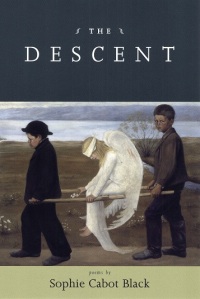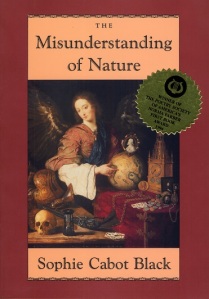Interview by Nicole Melanson ~
Sophie Cabot Black is a poet, essayist, mother, and activist, all in a different order on different days. She is grateful to have three books out in the world: The Misunderstanding of Nature, The Descent, and The Exchange, all from Graywolf Press. Her work appears from time to time in the usual places (everywhere from The New Yorker to Tin House), but there is much time between books and so she is not a regular contributor to any one magazine. A slow and determined-to-be-careful writer, Sophie loves parenting, and teaching, and in general getting distracted, and so inside that equation, seems to put out a book every ten years.
Sophie’s books at Graywolf Press
Sophie Cabot Black on Facebook
HOW DID YOU GET STARTED?
Rather than watch (on a school television!) the Mets in the 1969 World Series, I chose instead to go into a small classroom with a volunteer housewife substitute teacher, who put Life magazine pictures up on the wall, and asked those few students who were not interested in watching the baseball games instead to write, to respond to those pictures. That was it for me. The feeling solidified into that’s what I want to do, not so much as an occupation, or even as a grownup, but as a person, for the rest of my life.
From that point on (11 years old) I wrote but not with any mind toward showing to anyone. After a solid liberal arts undergraduate education, I was teaching ex-convicts in New York when someone suggested I take a writing course myself. I ended up applying and going to Columbia University’s MFA program where I met some wonderful peers and a few incredible and inspiring poets-who-also-taught. I sat at the hem of Stanley Kunitz and soaked up all I could, and when I left after two years got brave enough to send out my first poems to The Atlantic Monthly magazine. They took one, and even though it took another two years for it to appear, I took that as a sign I should push myself harder, further, and into more of a public place. I still find it the most difficult place to be: trying to be productive when on the one hand I need to be utterly without thinking of the world in order to write, and yet there are those times I need to throw myself into the public world of publishing in order to be “a writer”, which, of course, turns into an important challenge.
WHAT IS YOUR LATEST BOOK OR CURRENT PROJECT?
My most recent book is The Exchange.
I am a very gradual writer, and at present I am pushing myself into trying other ways in which to put words in order, such as prose. I am also intrigued with how words, in our complicated and electronically oriented ways, have become both interwoven and taken for granted. So I am both reading the old texts and immersing myself in the new. And there are always a couple of unfinished projects I turn to each time I finish a book, only to find myself once again in a place I didn’t expect.

WHAT IS YOUR WORK ENVIRONMENT LIKE?
Utterly chaotic! BC (before children) I scoffed at those who carried their work with them each day to cafes, parties, bed. I was a precious binge writer, who needed complete and utter silence, and a ridiculous idea of how I needed to control all in my environment in order to be able to write. Now, as I write this: a dog is barking, the laundry is beeping and one child is calling while the other pretends to be asleep. The desk (long ago are the days of organized piles) is covered in unread articles, bookmarked chapters, friends’ unread books. Below in an old cradle are piles and piles of things to be filed. But I know that all this also gives me comfort.
Ecstasy for me is a day when I have read a bit, written enough to solve a problem or two, and then get to make dinner for all those who come home. There is great peace for me in a house that hums along in its way. When I was growing up (and I am still in the same house!) I took care of many animals in many stages of their lives, and that dailiness, that dependence on weather and light, is a great centering piece that enables me to write. BC, I flitted from artist colony to friends’ sheds etc, and I did great writing there too, but this feels more real somehow. Maybe I just like feeling like I am a part of some larger whole.
WHEN DO YOU WORK? WHAT DOES A TYPICAL DAY LOOK LIKE?
I am unable to write every day: work, children, domesticity, all can take over. I used to own the night; now it is hard to stay up enough to use even a part of it. There are a few women in my life whose novels bring home their entire household’s livelihood and they have gotten into rhythms I cannot imagine of every day writing, of necessity. I am not sure how that would work for me, or how productive it would be for me as one who is so easily distracted but also fed by the world. Also, I feel this impulse to not want to dilute my words by writing them all out all the time. This may be counter-productive, or some sort of lame excuse, but somehow the way I have made this magical thinking work is by trying to use any empty time to feed my head, to read, to think. That said, I am also quite jealous of the devotion some of my peers have to the every day picking of words.

WHAT IS YOUR WRITING PROCESS?
I read, I take classes, I listen to words. I find myself phrasing, image-connecting, and trying to write everything down when I think it worthy, or I want to remember it, which most recently, has become a challenge, having an electronic device more readily available than my notebook. (What seems more convenient comes at a price.)
WHY DO YOU DO WHAT YOU DO?
I have never been sure. All I know is that writing, and reading, gives me a center from which I can live. Days come when I think all I want to do is to farm and to read. (And the time for that is over, not even possible anymore.) And as to writing, I have always been doing so, while reading, while paying attention to the domestic, etc. and it feels like I can’t separate it out enough to really talk about it coherently.
WHO OR WHAT INSPIRES YOU?
Many things, most things; some days, all things. I know that sounds evasive, but the real sentence ends with “the world”. Having said that, there are days I am slayed by the world, and so for solace, I turn to music. I used to turn to words, but right now, I am overwhelmed by how we are using and abusing them.
WHAT IS THE HARDEST PART OF WHAT YOU DO?
Sitting down and getting to it. Giving myself permission. I repeat, giving myself permission! But then afterwards, to be supportive of my own work, that is perhaps the second hardest part; I deeply admire, and am envious, of those who can do so with what looks like ease.

WHAT DO YOU WISH YOU HAD KNOWN WHEN YOU STARTED?
I wish I had gotten into more of a rhythm that would have more quickly become inherent — much, much time was wasted: on drama, on rescuing others, on a precocious and unsafe childhood. I wish I knew then that I was allowed to take myself out of those realms, which would have made my life simpler.
WHAT IS YOUR ARTISTIC OR PROFESSIONAL VISION?
For all to read more, listen more, open our hearts more. I can only think good things would come from this. The human condition will always keep us from a full and lasting peace and so I only wish we made it easier for ourselves, on ourselves, requiring art.
WHO ARE YOUR FAVORITE FEMALE AUTHORS?
There is always a core for me that I turn to: Emily Dickinson and H.D., to name a couple. My current favorite fiction writers are Toni Morrison and Louise Erdrich. And two poets I am always, always reading are Jorie Graham and Louise Glück.
Thank you, Sophie Cabot Black!
— Nicole Melanson
Like this interview? Follow WordMothers or Subscribe to meet more great female authors!


Ahh I LOVED reading this interview Sophie ! The whole lot- your chaos, your inspirations, your visions, … your love of words , the everything! I have LIKED you instantly on FB and hope to get to some of your works some day. Not being a kindle reader makes it tricky but I’ll certainly remember you from this!
Nicole, as you know…one of my favourite blogs this! Never stop! Happy day both of you!xx
LikeLiked by 1 person
Another lovely interview, Nicole. And like Dominique before me, I also found Sophie’s chaotic style reassuring.
LikeLike